
Glottometrics
Scope & Guideline
Harnessing Quantitative Methods to Decode Language Dynamics
Introduction
Aims and Scopes
- Quantitative Linguistics:
The journal emphasizes the application of quantitative methods to study language patterns, providing robust statistical analyses that enhance our understanding of linguistic phenomena. - Stylometry and Text Analysis:
A core area of focus is stylometry, where the journal publishes studies that analyze literary and linguistic styles quantitatively, examining authorship, genre, and language evolution. - Corpus Linguistics:
Glottometrics frequently utilizes large corpora to derive insights into language use in various contexts, allowing researchers to explore language variation across different registers and genres. - Computational Linguistics and Modeling:
The journal encourages innovative computational approaches, including modeling linguistic structures and processes, to uncover underlying patterns in language data. - Interdisciplinary Approaches:
Glottometrics welcomes interdisciplinary research that combines linguistics with fields such as cognitive science, psychology, and social studies, reflecting the complex interplay of language and cognition.
Trending and Emerging
- Application of Distributional Semantic Models:
Recent publications have increasingly explored the use of distributional semantic models, particularly in historical and inflected languages, showcasing an interest in how meaning evolves and varies across contexts. - Dynamic Language Analysis:
Studies investigating the dynamics of language, such as the impact of social phenomena (e.g., COVID-19) on word usage, have gained prominence, reflecting a broader interest in real-time language change. - Quantitative Approaches to Multilingualism:
There is a growing trend in exploring multilingual contexts and the quantitative analysis of language contact phenomena, such as loanwords, which reflects the increasing globalization of language studies. - Integration of Cognitive Science:
Research that integrates insights from cognitive science and linguistics is on the rise, indicating a trend towards understanding language processing and structure through a cognitive lens. - Stylometric Comparisons in Political Discourse:
Emerging studies that quantitatively analyze stylistic features in political texts suggest a burgeoning interest in the intersection of linguistics and political communication.
Declining or Waning
- Historical Linguistics:
Research focusing on historical aspects of language, while still relevant, has decreased as newer methodologies and themes emerge, particularly those centered on contemporary language use and digital corpora. - Traditional Syntax Studies:
There is a notable decline in papers specifically dedicated to traditional syntactic analysis, as the journal's focus shifts towards more quantitative and computational approaches to syntax. - Linguistic Theory without Empirical Data:
Theoretical discussions that do not incorporate empirical data or quantitative analysis are becoming less frequent, as the journal increasingly prioritizes data-driven research.
Similar Journals
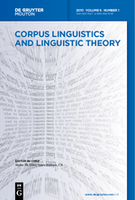
Corpus Linguistics and Linguistic Theory
Exploring the intersection of theory and corpus methodologies.Corpus Linguistics and Linguistic Theory, published by DE GRUYTER MOUTON, is a premier academic journal dedicated to advancing the interdisciplinary field of linguistics through the lens of corpus-based research methodologies. With an ISSN of 1613-7027 and E-ISSN 1613-7035, this journal is a valuable resource for linguists, researchers, and students who aim to investigate language structures, usage, and their theoretical implications. Recognized as a Q1 journal in the realm of Linguistics and Language, it boasts impressive Scopus rankings, positioning it within the top 7% and 8% of its categories in the Arts and Humanities and Social Sciences, respectively. Its relevance is underscored by a commitment to publishing rigorous research from 2005 to 2024, addressing contemporary advancements in linguistic theory fueled by empirical data. While the journal is not open access, it remains an essential platform for disseminating high-quality scholarship that informs both theoretical perspectives and practical applications in linguistics. As such, Corpus Linguistics and Linguistic Theory plays a crucial role in shaping the future of linguistic studies, making it indispensable for anyone engaged in this dynamic field.
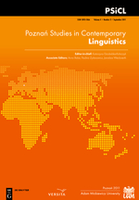
Poznan Studies in Contemporary Linguistics
Bridging theory and practice in language studies.Poznan Studies in Contemporary Linguistics, published by DE GRUYTER MOUTON, is a pivotal journal in the field of linguistics, with an ISSN of 0137-2459 and an E-ISSN of 1897-7499. Located in Germany, this esteemed journal has consistently contributed to the academic landscape since its inception. As of 2023, it holds a Q2 category rank in Linguistics and Language and boasts commendable Scopus rankings, featuring in the 69th percentile for Arts and Humanities and the 66th percentile for Social Sciences. The journal emerges as a vital platform for scholars to explore contemporary linguistic theories and practices, making it an essential resource for researchers, professionals, and students alike. With a converged publication period from 2007 to 2024, it aims to facilitate a deeper understanding of linguistic advancements and trends. While the journal currently does not offer open access, its rigorous peer-review process ensures the highest quality of published research, strengthening its role as a leading discourse in the dynamic field of linguistics.
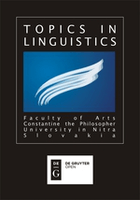
Topics in Linguistics
Connecting Scholars Across Linguistic DisciplinesTopics in Linguistics is a premier academic journal published by SCIENDO, specializing in the dynamic and expansive field of linguistics. With its Open Access model adopted since 2013, this journal ensures that groundbreaking research is readily accessible to scholars and enthusiasts alike, fostering collaboration and advancement in language studies. Indexed in prominent databases, it holds a Q2 ranking in the linguistics category for 2023, indicating its influence and relevance within the academic community. Hailing from Germany, the journal has established a strong international presence, ranking #291 out of 1088 in Arts and Humanities and #349 out of 1167 in Social Sciences—placing it in the top 25% of journals within these fields. Topics in Linguistics serves as a vital platform for researchers to disseminate innovative findings and engage with ongoing debates in the linguistics landscape, making it an essential resource for students, professionals, and academics committed to exploring the intricate layers of language and communication.

Language and Linguistics Compass
Exploring the Frontiers of Linguistic KnowledgeLanguage and Linguistics Compass, published by Wiley, stands as a premier journal in the field of linguistics, showcasing innovative and interdisciplinary research. With its ISSN 1749-818X and E-ISSN matching, the journal has built a robust reputation, achieving an impressive Q1 ranking within the linguistics category for 2023, placing it in the top 4% of its field. Its Scopus rank of 48 out of 1167 highlights its influence and significance among linguistics journals, boasting a commendable 95th percentile. This journal serves as a vital resource for researchers, professionals, and students, offering a wide range of accessible articles that illuminate current trends and advances within the domain of language studies. Although it is not Open Access, the journal is committed to quality and diversity in its publications, ensuring scholarly articles from various sub-disciplines of linguistics are represented from 2008 through 2024. Located in the United Kingdom, Language and Linguistics Compass invites contributions from around the globe, reinforcing its status as a leading forum for linguistic discourse.
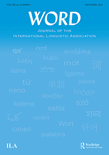
WORD-JOURNAL OF THE INTERNATIONAL LINGUISTIC ASSOCIATION
Connecting researchers and educators in the world of language studies.WORD-JOURNAL OF THE INTERNATIONAL LINGUISTIC ASSOCIATION is a leading peer-reviewed journal dedicated to advancing the field of linguistics and language studies. Published by Routledge Journals, Taylor & Francis Ltd, this esteemed journal has earned a reputation for its rigorous scholarship, reflected in its 2023 Q2 ranking in Linguistics and Language and its solid performance in Scopus Ranks. Encompassing a wide range of topics—from theoretical frameworks to empirical research—WORD serves as an essential resource for linguistics researchers, educators, and students alike. While currently not operating under an open access model, the journal is committed to providing high-quality, impactful research articles that contribute significantly to the linguistic community. With its convergence periods from 1998 to 2009 and 2015 to 2024, WORD continuously fosters the discourse of language studies, ensuring that critical insights and discussions are accessible for ongoing academic exploration.
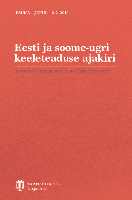
Eesti ja Soome-Ugri Keeleteaduse Ajakiri-Journal of Estonian and Finno-Ugric Linguistics
Elevating the Discourse on Unique Linguistic CulturesEesti ja Soome-Ugri Keeleteaduse Ajakiri - Journal of Estonian and Finno-Ugric Linguistics is a premier academic journal published by UNIV TARTU PRESS, dedicated to advancing the field of linguistics with a particular focus on the Estonian and Finno-Ugric languages. Since its inception, the journal has embraced an Open Access publishing model, allowing researchers and enthusiasts to freely explore its groundbreaking studies and findings since 2013. With an Impact Factor that places it in the Q3 quartile of leading journals within the linguistic domain, it serves as a vital platform for the dissemination of new research and theoretical advancements. Ranked 410th out of 1088 journals in the Arts and Humanities category for Language and Linguistics, it reflects a robust commitment to quality scholarship that appeals to academics, professionals, and students alike. Operating from Tartu, Estonia, the journal aims to foster greater understanding and appreciation of the Estonian language within the broader context of Finno-Ugric studies, making it an essential resource for anyone interested in these unique linguistic cultures.
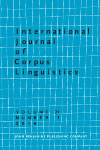
International Journal of Corpus Linguistics
Empowering Scholars to Decode LanguageThe International Journal of Corpus Linguistics, published by John Benjamins Publishing Co, is a premier academic journal dedicated to advancing the field of corpus linguistics. With an ISSN of 1384-6655 and an E-ISSN of 1569-9811, this journal serves as a pivotal platform for researchers and practitioners alike to explore the intricate relationships between language and corpora. Housed in the Netherlands and operating within the prestigious Q1 category in Linguistics and Language, the journal boasts impressive Scopus rankings, positioning it in the top percentiles of both Arts and Humanities and Social Sciences. Its commitment to rigorous peer-reviewed scholarship not only enhances understanding in the domain but also fosters collaboration among scholars. With coverage spanning from 1996 to 2024, the journal publishes cutting-edge research that contributes valuable insights into linguistic patterns and empirical studies. Whether you're an established researcher or a student embarking on your academic journey, the International Journal of Corpus Linguistics is an essential resource for anyone seeking to deepen their understanding of language through corpora.

RLA-Revista de Linguistica Teorica y Aplicada
Advancing linguistic discourse through innovative research.RLA-Revista de Linguística Teórica y Aplicada, published by Universidad de Concepción, Facultad de Humanidades y Arte, stands as a vital resource in the field of linguistics, delivering cutting-edge research and scholarly articles that contribute to both theoretical and applied linguistics. With its ISSN 0718-4883, this journal aims to foster robust discussions and innovations in linguistic theory, language acquisition, sociolinguistics, and applied linguistics methodologies. Although the journal currently does not provide open access options, it endeavors to reach a diverse audience, including researchers, professionals, and students, who are keen to explore the rich tapestry of language studies. By offering insights from both local and global perspectives, RLA does not only advance linguistic discourse but also encourages interdisciplinary collaboration, thereby solidifying its role as a pivotal publication in the linguistic academic community.

Studii de Lingvistica
Empowering voices in the field of linguistics.Studii de Lingvistica is a premier open-access journal committed to advancing the field of linguistics and language studies since its inception in 2011. Published by EDITURA UNIV ORADEA in Romania, this scholarly platform aims to disseminate high-quality research that encompasses various aspects of linguistics, encouraging contributions from researchers and professionals worldwide. With an impact factor that reflects its relevance, the journal holds a prestigious position in the Q2 category of Linguistics and Language for 2023. Despite its relatively nascent H-index, Studii de Lingvistica has carved a niche for itself, ranking 1017th and 1094th in Scopus across Arts and Humanities and Social Sciences, respectively. Researchers, scholars, and students alike will find valuable insights and pioneering studies within its pages, making it a vital resource for those engaged in the nuanced exploration of language and its cognitive dimensions. Located at UNIVERSITATII ST NO 1, PAVILION C, ORADEA, BIHOR, ROMANIA, this journal continues to foster academic dialogue and innovation within the linguistics community.

SKASE Journal of Theoretical Linguistics
Connecting Scholars Through Innovative Linguistic ResearchSKASE Journal of Theoretical Linguistics, published by the SLOVAK ASSOCIATION STUDY ENGLISH-SKASE, is a distinguished Open Access journal that expands the horizons of linguistic research and theoretical frameworks. With its ISSN N/A and E-ISSN 1336-782X, the journal has established itself as a pivotal resource for scholars in the field, achieving a commendable Q2 ranking in Linguistics and Language as of 2023. The journal, which has been in continuous publication since 2017, actively publishes innovative research studies, reviews, and theoretical discussions, easing access to groundbreaking work for academics and practitioners alike. Based in Slovakia, it connects a rich heritage of linguistic scholarship and is indexed in Scopus, ranking alongside its peers in both Arts and Humanities and Social Sciences categories. The SKASE Journal of Theoretical Linguistics is crucial for anyone interested in the evolving landscapes of linguistics, serving as an invaluable platform for disseminating knowledge and fostering collaboration amongst researchers worldwide.